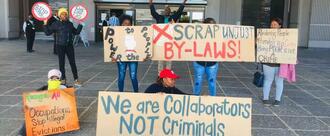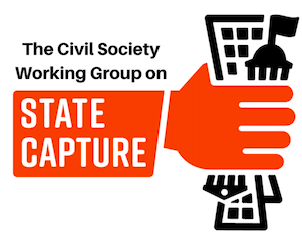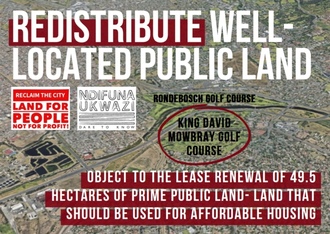- Featured
- Clean air
- Climate justice
- Consumer Rights
- Corporate Accountability
- Data access
- Early Childhood Development
- Economic fairness
- Education
- Electoral fairness
- Environmental justice
- Food justice
- Gender based violence
- Grants/social assistance
- Health
- Housing and infrastructure
- Industry interference
- Land Justice
- LGBTQIA+ rights
- Media/ information access
- Public transport
- Racism
- Reparations
- Safety
- Sanitation
- Service Delivery
- Sexual and Reproductive Rights
- Social justice
- Unemployment
- Womxn's rights/ gender equality
- Workers' rights
- More
-
SAVE THE VAAL MARINA WATERFRONT PARK - RENEW THE LEASEThe Vaal Marina Waterfront Park is more than just a green space, it is a symbol of community, freedom, and shared heritage. For years, it has provided residents and visitors with a safe, accessible environment for recreation, relaxation, and connection. Its presence has contributed to the unique charm of Vaal Marina village and supported local businesses by inviting people to our community. Losing this space would be a blow not only to our quality of life but to the economic and social fabric of our town. We are calling on every resident, and concerned citizen to stand together and demand that the Midvaal Local Municipality renew or extend the park’s lease agreement. When we unite our voices, we send a clear message: this park matters. Public pressure is one of the most powerful tools we have. Municipal leaders are elected to serve the interests of the community, and when that community speaks loudly and clearly, they are compelled to listen. By signing this petition and sharing it with others, you’re helping build a wave of support that cannot be ignored. Whether through media coverage, council meetings, or direct engagement with decision-makers, our collective action can shift priorities and force meaningful decisions. The more signatures we gather, the stronger our case becomes — and the harder it is for officials to dismiss our concerns. This is our moment to protect what belongs to all of us. Join the campaign, sign the petition, and help ensure that the Vaal Marina Waterfront Park remains a vibrant, public space for generations to come. Together, we can preserve the heart of our community.1,272 of 2,000 Signatures
-
Fix broken public parks in Vosloorus immediately!The unavailability of proper and safe parks have led to children in the townships being locked inside their yards in order to safeguard them from external harm. This is a grave injustice as it not only leads to social isolation which negatively affects a child’s development, but it is a great contributor to health issues associated with lifestyle illnesses later in their lives. But this does not only speak to children as every member of our society gets affected by the lack of public playgrounds and training infrastructure. It is a fact that all four public parks and recreational facilities in the community of Ward 47 in Vosloorus are dilapidated without a single swing, slide, mary-go-round and exercising equipment being in a conducive state for public use. A few weeks ago over the spring holidays, my nephew had his trousers torn as a result of sliding down a rusty slide which almost caused an injury to his buttocks. Why has the municipality let such important infrastructure go unmaintained? Where are our children supposed to learn physical and social skills outside of the school playgrounds? After all, Outdoor play helps kids to build flexibility and creativity. They also have to learn to interact with other children, for example, at the swings or the slide, where they can learn about the importance of sharing and turn-taking [1]. In South Africa, diabetes is the most common cause of death in adult females, followed by cardiovascular disease and hypertension [2]. It is because of this reason that we cannot afford to have our townships' public recreational infrastructure neglected when the government should be encouraging physical activity and the culture of exercising, especially since the highest prevalence of obesity among South African adults, stratified by sex and race, was found to be in African women. We need to have our training equipment maintained in the same parks where our children play so that we can safely watch over them as we all stay active and keep in shape for our health and social benefits. Maintaining the equipment alone will not be enough if the environment itself is not physically inviting. This is why it is important to ensure that the grass stays cut and trees get pruned on a regular basis. People are social beings who need to participate in recreational activities in order to be stimulated. As a result, we need benches, picnic and braai areas, taps and garbage bins to be made available in our parks in as far as encouraging the culture of keeping our township litter free, especially in shared public spaces. There should also be employment of security guards to ensure that our parks stay secure and are alcohol free zones. This initiative will also create employment opportunities, thereby reducing the unemployment rate that is currently plaguing our country. Let us remind our local government that they have a responsibility over the wellness of our communities by adding your name to this petition. References [1] https://www.bbc.co.uk/tiny-happy-people/articles.Ryan [2] https://knowledgehub.health.gov.za/system/files/webinar/obesity-strategy.pdf26 of 100 SignaturesCreated by Nozipho Ntshingila

-
Fix the issues at the Dan Tloome Randfontein Housing Project"We are not safe,as every time it rains, the roofs get blown away. There are leaks in the ceilings, and the stair rails are not even stable," said a concerned resident. References [1] Dan Tloome Housing Project in the spotlight again by Dominic Duvenage for the Randfotein Herald. 18 January 2024. https://www.citizen.co.za/randfontein-herald/news-headlines/local-news/2024/01/18/dan-tloome-housing-project-in-the-spotlight-yet-again/ [2] Neglected Dan Tloome Mega Housing Project Residents Suffer A Severe Lack of Service Delivery. 21 September 2023. https://dagauteng.org.za/2023/09/neglected-dan-tloome-mega-housing-project-residents-suffer-a-severe-lack-of-service-delivery188 of 200 Signatures
-
Mayor finish building the Nogqala bridge in NgcoboWe have been promised the bridge for the past 20 years, but not having the bridge is affecting us as residents, children are unable to get to school when it rains they are forced to only return to school in May after the rainy season, which impacts their schooling. High school learners are even forced to rent places closer to the school just so they are able to attend classes [2] We can’t go to the clinic to get treatment, we can't go to town. It's worse when someone passes on, we are forced to carry the coffin for a very long distance because we can't cross that river it's too dangerous. The river has claimed many lives and the delays by the municipality continue to threaten us as the community of Noqgala [3], if you add your name to this petition you can help us get the municipality to hear our cries we are tired of being ignored, 20 years is a long time and we need clear plans and a timeline of when will the bridge be completed. References [1] https://groundup.org.za/article/r97-million-spent-and-three-years-later-still-no-bridge/ [2] https://www.dispatchlive.co.za/news/2023-06-19-r10m-and-two-years-but-villagers-still-without-bridge/#google_vignette [3] https://youtu.be/XoMGTfRhokU67 of 100 SignaturesCreated by Thabisile Miya

-
WE DEMAND THE CITY OF CAPE TOWN WITHDRAW THE UNCONSTITUTIONAL UNLAWFUL OCCUPATION BY-LAWThe unlawful occupation by-law, gazetted on the 14th of February 2022 undermines the constitution and circumvents the PIE ACT. This by-law deviates from the Human Settlements Strategy which provides that the City should “proactively plan for informality.” The Unlawful Occupation By-law contradicts this aim, it seeks to criminalise poor and working-class people who have fallen through the cracks of the city’s housing waiting list. The City’s by-law on unlawful land occupation seeks to bypass the protections of PIE. It also provides the so-called “City officials” with large amounts of arbitrary and discretionary power over poor and working-class people.270 of 300 SignaturesCreated by Aphiwe Ngalo
-
#ThePeopleSay #WakeUpSA: Raising our voices against state capture and corruptionWe have elected leaders and bestowed on them the responsibility to govern, to enable us to achieve a better life for all – not themselves. We, as people of South Africa, have a right to know in whose interests’ decisions – supposedly in "our” name – were and continue to be made. The culture of secrecy and impunity must come to an end if our democracy is to thrive. Transparency and accountability are non-negotiable, as too are the requirements for transformative actions to address the injustices that remain embedded in our social, economic and political systems. Our constitution is revolutionary in its design, but the values and vision that it prescribes can only materialise if embraced by the state through which it is enacted. As people of this country, we all support the value and vision in the Constitution which protects the rights of the people in our country, it is the bedrock of our democracy and foundation of the rule of law. We, the undersigned, support/endorse this open letter to raise our voices in solidarity against state capture and impunity, and to say now is the time for us to be heard. The realities of the current moment cannot be met with silence and complacency. #ThePeopleSay #Wake-Up SA! Civil Society endorsements: Alternative Information and Development Centre (AIDC) Centre for Applied Legal Studies (CALS) Council for the Advancement of the South African Constitution (CASAC) Corruption Watch (CW) Dullah Omar Institute (DOI) Equal Education (EE) Freedom Under Law (FUL) Legal Resources Centre (LRC) My Vote Counts (MVC) Open Secrets Organisation for Undoing Tax Abuse (OUTA) Public Affairs Research Institute (PARI) Section27 (S27) Southern African Faith Communities’ Environment Institute (SAFCEI) Right2Know (R2K)78 of 100 SignaturesCreated by Civil Society Working Group on State Capture (CSWG)

-
Lindiwe, what happened to the R600 million in Rent Relief?On 21 July 2020 the Minister of Human Settlements, Water and Sanitation Lindiwe Sisulu announced in her budget vote speech that her Department planned to allocate R600 million towards rental relief to tenants in affordable housing facing financial distress due to the COVID 19 pandemic. The funding, aimed at tenants in ‘formal affordable housing’ was meant to help those facing potential homelessness to meet their monthly rental obligations. This in turn would assist landlords who depended on rental income to survive. In her speech, the Minister made the undertaking that the details of the rent relief for such tenants would be published 30 days after her address.[2] IT IS NOW MORE THAN EIGHT MONTHS FOLLOWING THIS COMMITMENT AND NO DETAILS OF THE RELIEF SCHEME; NO POLICY PUBLISHED, AND NO FUNDING HAS BEEN RECEIVED BY TENANTS, WHO MAKE UP SOME OF THE PEOPLE HARDEST HIT BY THE PANDEMIC IN OUR COUNTRY. The stark reality is that between 2.2 and 3 million people lost their jobs in the first months of lockdown.[2] This has created a situation where households are caught in a double bind between maintaining their shelter and having enough food and water to stay alive. Correspondingly, the TPN Residential Rental Monitor for the fourth quarter of 2020 found that low end tenants had the weakest rental payment performance. Specifically, the report states that: “the “Less than R3,000/month” rental segment is populated by the most financially fragile tenant population, with significantly fewer financial “buffers” with which to weather any storms that translate into income loss, or those unexpected household expenses that arise periodically.” [3] In fact, the undertaking to provide R 600 million in rent relief was made to prevent the crisis that many of the 3 720 000 tenants [4] living in South Africa may now find themselves in. Albeit too little too late for tenants who have fallen victim to unlawful action by landlords and service providers across the country.[5] The consequences of these shortcomings taken together might be even more dire: on 9 March 2021, DA Shadow Minister of Cooperative Governance and Traditional Affairs, Mr Cilliers Brink announced that the party is calling for the urgent lifting of Alert Level 1 lockdown regulations stating that the regulations make it “close to impossible” for property owners to obtain eviction orders.[6] We are teetering on the brink of a secondary national disaster where we stand to exacerbate a health crisis into a homelessness crisis. The former UN Special Rapporteur on the Right to Housing Leilani Farha has cautioned that “[i]n the face of this pandemic, a lack of access to adequate housing is a potential death sentence for people living in homelessness”[7]. Home has rarely been more of a life or death situation – Housing remains Healthcare! JOIN US IN DEMANDING THAT THE NATIONAL DEPARTMENT OF HUMAN SETTLEMENTS, WATER AND SANITATION DO THEIR JOB URGENTLY. [1] https://www.gov.za/speeches/minister-lindiwe-sisulu-human-settlements-dept-budget-vote-202021-21-jul-2020-0000# [2]https://cramsurvey.org/wp-content/uploads/2020/07/Spaull-et-al.-NIDS-CRAM-Wave-1-Synthesis-Report-Overview-and-Findings-1.pdf [3]https://www.tpn.co.za/Group/Home/Media [4] http://www.statssa.gov.za/publications/P0211/P02114thQuarter2020.pdf [5] https://www.iol.co.za/personal-finance/government-needs-to-subsidise-tenants-rentals-50528669 http://www.statssa.gov.za/publications/P0318/P03182019.pdf [6]https://www.da.org.za/2021/03/da-calls-for-lifting-of-lockdown-regulations-to-restore-private-property-rights [7]https://www.ohchr.org/Documents/Issues/Housing/SR_housing_COVID-19_guidance_rent_and_mortgage_payers.pdf1,724 of 2,000 SignaturesCreated by Mpho Raboeane
-
Public land must benefit all Capetonians - Object to the King David Mowbray Golf Course LeaseOver the last couple of weeks, the City of Cape Town has said that it is experiencing an unprecedented increase in poor people occupying vacant land. The vast majority of people occupy land out of necessity- they have nowhere else to go [3]. And a huge part of why people have nowhere else to go is because the state – at all levels – has failed to satisfy the need for housing or redistribute well-located land. This failure has exacerbated spatial inequality in Cape Town – which is the most spatially divided city in the country in terms of race and class. The City has consistently blamed this spatial injustice on the lack of well-located land that could be used for affordable housing. But the City often misses the most obvious solution: it already owns massive pieces of land in well-located areas. Land that is unused or not being used to its full potential, that could provide ample space for affordable housing and reverse the City’s apartheid legacy. Last year, Ndifuna Ukwazi released a research report exposing how the City is disposing of the public land it owns by leasing it to private organisations at massively discounted rentals [4]. This land includes parking lots that are empty for up to 18 hours a day, bowling greens with very few members, and massive golf courses that provide enjoyment to only a few wealthy residents on the weekends. This is an inefficient, exclusive and unsustainable way to deal with well-located public land. Surely this land should be put to better use? While the City has increased the rental tariff it charges for sporting purposes, which means that it will charge King David Mowbray Golf Course is R11 500 per year (as opposed to the R1 095 a year that it plans on charging Rondebosch Golf Club), this misses the point. Aside from still being an incredibly low rental for this land, it does not address the City’s obligation to redistribute public land. This land-use does not align with the City’s own inclusive development priorities and fails to give effect to the Constitution’s commitment to housing and equitable access to land. The redevelopment of the land leased to the King David Mowbray Golf Course offers a vital opportunity to act on a new vision for a just and more equal Cape Town. The land could be used to create an inclusive, environmentally sensitive suburb, with a positive urban environment and inclusive green spaces that bring people together rather than tear them apart. If we are serious about addressing Cape Town’s apartheid legacy, we need to make our voices heard. Object to the lease renewal of this prime public land that should be used for affordable housing before 25 August 2020. Ndifuna Ukwazi has put together this progressive submission you can use when sending in your own objection. We invite you to use this as a draft and tailor it to make your voice heard. If enough of us send in our objections we can stop the City of Cape Town from renewing the King David Mowbray Golf Course lease. [1] https://awethu.amandla.mobi/petitions/cheap-rent-for-the-rich-object-to-the-rondebosch-golf-course-lease-3 [2] City of Cape Town. 24 July 2020. Lease: Erven 29453, 29449, 29455, 32716 Cape Town, Raapenberg Road, Mowbray. Cape Argus. Available: https://jmp.sh/II39Y3i. [3] Bosch, Hazell and Clark. 2020. Making Room for Housing. Edited version published by Weekend Argus and IOL News on 8 August 2020. Full version available: https://jumpshare.com/v/ZMRTKEYftZpoCK8joDOe [4] Ndifuna Ukwazi. 2019. Cape Town’s Failure to Redistribute Land. Available: https://drive.google.com/file/d/1Pxly1G47qbC79l58Oss4vKvvK4AO71M-/view1,617 of 2,000 SignaturesCreated by Ndifuna Ukwazi

-
Cheap rent for the rich? Object to the Rondebosch Golf Course leaseCape Town is the most spatially divided city in the country - it is still separated along race and class lines. The City has consistently blamed this spatial injustice on the lack of well-located land that could be used for affordable housing. But the City often misses the most obvious solution: It already owns massive pieces of land in well-located areas. Land that is unused or not being used to its full potential, that could provide ample space for affordable housing and reverse the City’s apartheid legacy. Last year, Ndifuna Ukwazi released a research report exposing how the City is disposing of the public land it owns by leasing it to private organisations at massively discounted rentals [3]. This land includes parking lots that are empty for up to 18 hours a day, bowling greens with very few members, and massive golf courses that provide enjoyment to only a few wealthy residents on the weekends. This is an inefficient, exclusive and unsustainable way to deal with well-located public land. Surely this land should be put to better use? If we are serious about addressing Cape Town’s apartheid legacy, we need to make our voices heard. Object to the lease renewal of 45,99 hectares of prime public land that should be used for affordable housing before 9 March 2020. The experts at Ndifuna Ukwazi have put together this progressive submission you can use when sending in your own objection. If enough of us send in our objections we can stop the City of Cape Town from renewing the Rondebosch Golf Club lease. [1] Cape Town’s course of injustice: Subsidising the rich to exclude the poor, Michael Clark for the Daily Maverick January 28 2020 [2] https://rondeboschgolfclub.com/membership [3] Ndifuna Ukwazi: Cape Town’s failure to redistribute land https://drive.google.com/file/d/1Pxly1G47qbC79l58Oss4vKvvK4AO71M-/view1,247 of 2,000 SignaturesCreated by Ndifuna Ukwazi

-
Save Msunduzi CityThe Msunduzi Local Municipality is dysfunctional and is on the brink of collapse and as residents and ratepayers of Msunduzi, hereby unanimously voice our strong and serious concern at the continued lack of effective and efficient delivery of basic services. We demand that the Msunduzi address and improve the service delivery issues and implement the auditor-general report recommendations of (2017-2018) by the 15 April 2019 failing which we, the long suffering residents and ratepayers of Msunduzi, will have no alternative but, in terms of Section 139 of our National Constitution, to motivate for National and Provincial intervention in the local government and management of Msunduzi, including that the Council be dissolved and the municipality placed under administration.5,663 of 6,000 SignaturesCreated by Anthony Waldhausen
-
Title deeds for the deserving residents of Pennyville flatsThe majority of people living in Pennyville are currently either unemployed or the families are child run or elderly run with most receiving grants. Most of them cannot afford the rentals and therefore in arrears amounting to thousands of rands. Attempts to address this matter with the relevant authorities have been unsuccessful.59 of 100 SignaturesCreated by Thabiso Seipobi
-
Stop all farm evictions1. Over 20 000 people are threatened by farm evictions in the Western Cape, Tshintsha Amakhaya is calling on president Cyril Ramaphosa to keep his promise following an announcement he made in Paarl in 2014 that there will be a moratorium as an immediate ban on legal and illegal farm evictions. Following the massive farm workers strike in De Doorns, Ramaphosa said, “We are calling on all farmers who have plans for evictions to stop the evictions.” However, the moratorium never came to effect. Instead, instances of farm evictions and human rights violations on farms persist. Today, Drakenstein Municipality has about 1,127 pending eviction matters. 2. The thousands of illegal evictions of farm workers and other farm dwellers continue to be evicted across the country despite the clear protections contained in the Extension of Security of Tenure Act 62 of 1997 (‘ESTA’) that a farm worker and persons living in the same dwelling as the worker may only be evicted: a) in terms of an order of the court b) once the court is satisfied that the eviction would be just and equitable c) and once the Land Claims Court has confirmed the order; 3. The great hardship, conflict and social instability caused by such evictions on a group of people already rendered vulnerable through their insecure tenure. 4. The disproportionate impact of these illegal evictions on women due to the commercial agricultural system that continues to confine women to an auxiliary labour category increasing their vulnerability to labour-related evictions. 5.The total system failure to protect the rights and security of farm workers and dwellers due to poor enforcement and resource endowment of ESTA; 6. The continued failure of municipalities to provide adequate alternative shelter as legislatively prescribed. 7. The Constitutional imperative, in section 25(6), to ensure that person whose tenure of land is legally insecure as a result of past racially discriminatory laws or practices, like farm workers and other farm dwellers, are provided with either legally secure tenure or comparable redress. Both farm workers and dwellers should be prioritised and be at the forefront of cases on which expropriation without compensation will be tested. “We used to work hard on this farm until we were retrenched in 1999. Nothing happened on the farm for 11 years and most of us couldn’t find work again. Now this farmer wants to evict us” This a desperate cry by a mother whose family is facing eviction from the farm she's worked and lived in for years [1]. She, like many others, now face a bleak future of being dumped on the road side with no protection and nowhere to go. President Cyril Ramaphosa made a promise in 2014 to stop farm evictions until people can be given dignified housing [2]. Even more recently, Deputy Minister Mcebisi Sikwatsha has seen with his own eyes the desperate situation farm workers are faced with [3] and also made promises to take it up with his Minister and President. We however cannot leave it to them. Thousands of illegal evictions of farm workers and other farm dwellers continue to be evicted across the country despite the clear protections contained in the Extension of Security of Tenure Act (ESTA). Places like Drakenstein are eviction hotspots with 1,127 pending evictions matters [4]. Evictions bring great hardship, conflict and social instability. The failure to protect the rights and security of farm workers and dwellers due to poor enforcement of ESTA and the failure of municipalities to provide adequate alternative shelter as legislatively prescribed need to be addressed. We need to stand with those being evicted and demand that government responds to the cries of the people. Will you tell President Cyril Ramaphosa and Minister Maite Nkoana-Mashabane to stop all farm evictions and help protect the rights and security of farm workers and dwellers? [1] [3] Western Cape could be testing ground for land expropriation without compensation, says minister, Barbara Maregele for Groundup News. 5 June 2018. [2] Ramaphosa asked to keep his promise to freeze farm evictions, Barbara Maregele for Groundup News. 5 April 2018. [4] Woman faces eviction after 51 years on a farm, Barbara Maregele for Groundup News. 31 May 2018.426 of 500 SignaturesCreated by Tshintsha Amakhaya

.png)
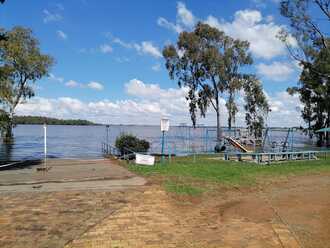
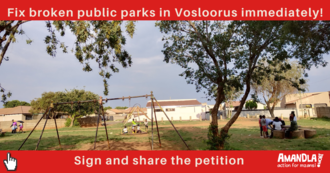.png)

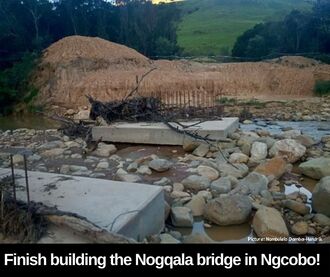.jpg)
